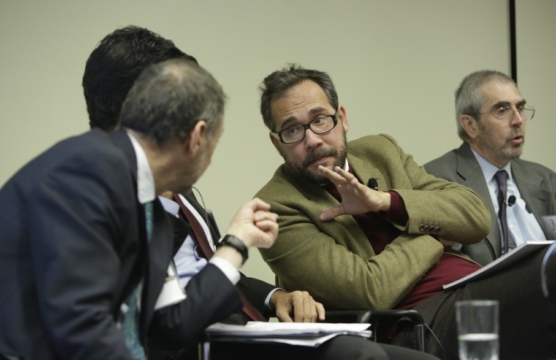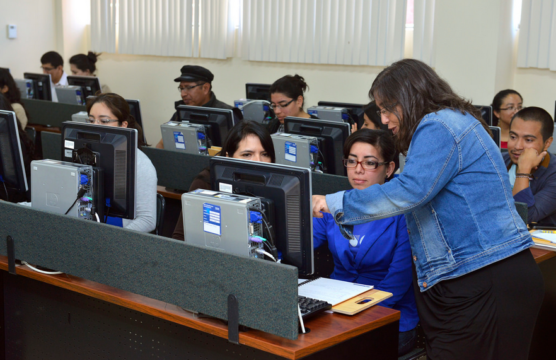
Mexico’s Energy Reform & the Skills Gap
Mexico has no shortage of skilled workers but needs to better align the qualifications of its graduates with the needs of the energy sector.
This post is also available in: Español
On September 8, the Inter-American Dialogue’s Education Program, together with Coursera, convened a public online event to present the findings of Coursera’s Global Skills Report and showcase new trends in the labor market. With a focus on the changing demands of the labor market in Latin America and the Caribbean, Nicole Amaral, Coursera’s Skills Transformation Lead for Latin America and the Caribbean, recounted the implications of these demands.
Ariel Fiszbein, director of the Inter-American Dialogue’s Education Program, moderated a panel between Ricardo Ruiz de Viñaspre, national director of the National Training and Employment Service (SENCE); Martha Barroso González, director of People and Culture at ManpowerGroup Latin America; Christie Brown, Chevron's petrotechnology management sponsor; Carlos Mario Estrada, general director of the National Learning Service (SENA); and Joana Barbany, general director of the Digital Society of the Generalitat de Catalunya.
The findings presented by Amaral are intimately linked to the implications of the Covid-19 pandemic on issues such as education and the job market. Given the acceleration of digitalization, the future of the job market was already a relevant issue, but in the post-pandemic world, we now see more than 80 million displaced jobs, with vulnerable populations affected disproportionately. Unequal access to the internet, Amaral said, is linked to unequal access to school, with women and young recent graduates being the most affected. It is estimated this represents the loss of a decade of work in terms of improving labor inclusion for women.
Regarding the use of the platform, Amaral stressed that workers in “vanguard” countries had a tendency to be highly skilled in abilities on Coursera, with workers having greater economic participation in the country, thus resulting in a lower concentration of wealth. This has allowed workers to cultivate technical skills. On the contrary, in other countries, they noticed a trend towards the development of soft skills, such as communication and business at the basic level, at the expense of more tangible skills, remaining in the lowest quintile in terms of advanced skills in business and technology.
However, there were results with interesting implications for Latin America. While 17 out of 23 Latin American countries were found to lag behind in terms of software engineering skills and math skills, a strength was identified in the area of data science. In the future, it would be interesting to explore the initiatives that have driven the region’s strong development in data science in order to determine the reasons for its success. Additionally, taking into account that according to Amaral you can now train workers in digital skills in 35-70 hours, there exists a possibility of being able to close this gap with initiatives and public policies for adequate employment.
Keeping all of this in mind, is a career really necessary now that we can train someone faster? According to Barroso, in the five sectors with the highest labor demand in the coming years, the roles currently open do not require industry-specific experience, these being: operation and logistics, manufacturing, data analysis, digital marketing, and, finally, the administration industry and office support. Estrada added, in addition, that within the framework of Industry 4.0 employers are hiring more staff without degrees, resulting in the modernization of training environments to respond to the demands for life-long learning ("life-long learning" is a term that implies constant training throughout professional life without an end date, e, contrary to a technical or professional career).
Estrada and Barbany commented that all workers and apprentices will find themselves forced to continue learning and training new skills as a result of digitalization. Estrada said that in the coming years, jobs consisting of repetitive and operational tasks will disappear. Additionally, several speakers considered that the acceleration of digitalization allowed faster progress towards remote work while increasing the digital divide for those without digital skills. They predict that sectors such as artificial intelligence, the Internet of Things (IoT), and in general, the digital world will be even more important for the private sector. Regarding the future of employment, Ruiz de Viñaspre believes that the only way to know it for sure is through data-driven analysis, thus being able to train vulnerable groups according to the needs of the productive sector.
One of the most relevant conclusions is that in-person activities will return, although to a lesser or greater extent depending on connectivity, the levels of digitalization of each country and the labor sector. Barbany remarked that, unfortunately, both the public and private sectors' traditional work styles were notably affected, having a long-term effect on workers’ lifestyles. To account for the new challenges for human connectivity in hybrid and remote models of work, Christie Brown posed the following questions: How can we really collaborate and connect on the human side when you are not seeing the other face to face? How do you learn to lead in a digital environment?
As progress is made and we return to in-person activities, Brown believes it will be important to not lose what has been learned about hybrid work models to allow for greater diversity, more double degrees, inclusion and collaboration. For example, a significant increase in popularity was identified in STEM courses of study -those related to science, technology, engineering, and mathematics-, by people in a situation of unemployment, women, and those in personal care industries, implying they may be able to achieve digitalization and make their way into the labor market through these means, allowing them to follow technological and labor mega-trends. Likewise, with teleworking Barbany finds a ray of hope for rural communities through digitalization, believing it to be a possible solution to the waves of migration from rural to urban areas through the implementation of initiatives such as the Barcelona Digital Talent Project, whose objective is to train people around the territory of Catalonia in order to meet the demand for digital skills while including them in the process of digitalization and economic growth without the need to leave their place of origin.
Regarding the humanistic perspective, Barroso mentioned that the pandemic brought us very close to vulnerability at both the industrial and personal levels, leading us to collectively understand that it is time to learn new skills and competencies, both technical and behavioral. When talking about behavioral competencies, he referred to responsibility, resilience, adaptation, and the ability to empathize with others so as to manage the emotional health of the work team. In addition, several panelists mentioned that programs that consider both in-person and virtual alternatives are necessary in order to advance human development. Fully remote programs are not the answer even though the digital workplace is here to stay, and panelists expressed the same concerns about critical thinking, leadership, and teamwork skills which are hindered by a remote environment.
To conclude the panel, Fiszbein invited recommendations to be made for those who are thinking of changing their careers as a result of what was presented. All panelists agreed that the ideal choice would be to simply apply to new positions, as the industry is looking for adaptable people with the ability to transfer their soft skills, such as communication, leadership, and empathy to these new developing sectors. With change as the only constant, Brown, Barroso, and Barbany highlighted the importance of differing perspectives due to gender, emphasizing the issue of constant training and how the new ways to work open doors for women in the labor market, inviting them to apply to all kinds of positions without fear.
Finally, Fiszbein summarized the main conclusions and commonalities that were mentioned by the panelists, highlighting how the pandemic forced us to move faster and change our work and training ecosystems. He emphasized that the greater diversification of apprenticeship programs, the greater focus on skill acquisition, and the popularization of hybrid models are the result of partnerships between private companies, state institutions, and academia. With this being the solution to the challenge imposed by the uncertainty of the future of employment, it will hopefully not find itself in the hands of a single actor.
Mexico has no shortage of skilled workers but needs to better align the qualifications of its graduates with the needs of the energy sector.
There is a gap between the skills that the Latin American workforce offers and the skills that companies in the region demand.
Preparing students for the 21st century requires the use of ICTs and technology in schools
 Drazen_ / iStock
Drazen_ / iStock

